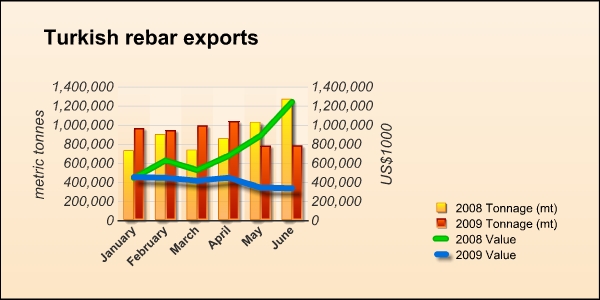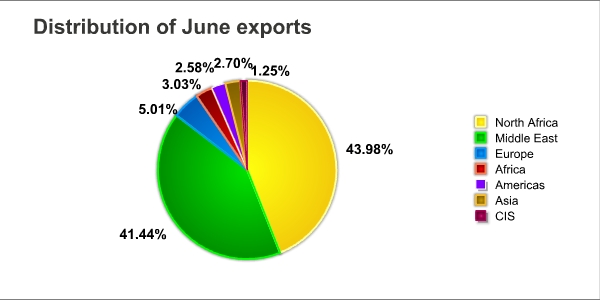According to the data provided by the Istanbul Mineral and Metals Exporters' Association (IMMIB), in the first half of the current year Turkey's total rebar exports amounted to 5.444 million metric tons, decreasing by 1.31 percent year on year. Meanwhile, the revenue generated by these exports totaled $2.442 billion, decreasing by 44.76 percent compared to the same period of the previous year. Thus, although the volume of rebar exports did not register any significant retreat year on year in the first half of 2009, the revenue generated by these exports declined sharply due to the low prices in the global steel industry.
In the first six months of 2009, the amount of rebar exported from Turkey to the Middle East countries reached 2.255 million mt, down 44.72 percent year on year, totaling a value of $985 million, down 70.34 percent compared to the value in January-June 2008. In particular, rebar exports to the UAE fell by 70.56 percent year on year, from 3.031 million metric tons to 892,630 metric tons.
On the other hand, in the period in question Turkey's rebar exports to North Africa totaled 2.394 million metric tons, up 2,299 percent year on year, totaling a value of $1.084 billion, up 1,238 percent compared to the value in the same period of the previous year. In particular, in the first six months of 2009 exports to Egypt increased by 10,593 percent year on year from 18,545 metric tons to 1.983 million metric tons.
According to a report on the Egyptian economy released by Bank Audi, a Lebanon-based bank which operates principally in the MENA region, construction activity in Egypt is still being triggered by new housing units being built in newly-established cities, by a government plan to overhaul and expand the country's infrastructure and by a series of multi-billion dollar realty development projects in various sectors, such as a US$9.5 billion refinery and petrochemical plant at Kafr al-Shaikh and a US$8.7 billion container terminal at Eastern Port Said.
The Egyptian government has allocated EGP 8 billion (approx. US$1.43 billion) for infrastructure projects in its FY 2009-10 budget, but this figure, though important, seems modest when considering the upgrading plans that aim to draw private-public partnerships and can rise tenfold. These projects include new Nile River ports, new highways and the overhauling and expansion of airports. New housing projects and tourism investments are the other factors that are boost the construction sector in Egypt.
In January-June 2009, Turkish rebar exports to Europe amounted to 272,674 metric tons, decreasing by 41.33 percent year on year, totaling a value of $128.093 million, down 64.53 percent compared to the same period of the previous year.
In the period in question rebar exports to the Americas totaled 140,478 metric tons, down 57.74 percent year on year, totaling a value of $70.900 million, decreasing by 72.54 percent compared to the first six months of 2008.
In the first half of 2009, Turkish rebar exports to the CIS amounted to 68,155 metric tons, decreasing by 6.83 percent year on year, totaling a value of $33.875 million, down 45.10 percent compared to the value in the same period of the previous year.
In January-June 2009, Turkish rebar exports to Africa amounted to 164,796 metric tons, decreasing by 16.75 percent year on year, totaling a value of $76.739 million, down 49.82 percent compared to the same period of the previous year.

